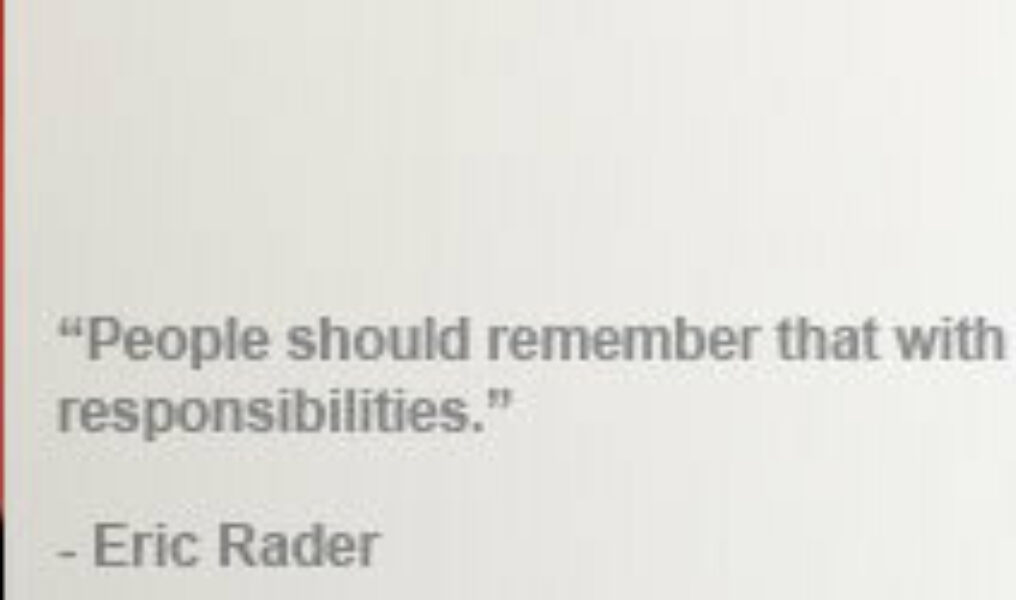By Eric Rader

As the nation reels from the horrible tragedy in Arizona, it's important to consider what lessons we can draw from this awful episode. Over the past few years, the political debate in this country has become increasingly shrill, even hateful at times, as people have fought over highly contentious issues. In the immediate aftermath of the Arizona shootings, some commentators decried the volatile rhetoric of recent years and speculated on its role in the tragedy. While none of us know the true motives of the shooter, it is undeniable that the political climate in this country has become toxic. Rep. Gabrielle Giffords, D-Arizona, had spoken out against this toxicity prior to the shootings. Now, as she fights her way back from a gunshot wound to the head, the rest of us have a chance to consider how we can bring some healing to the country's political discourse.
We in the LGBT community know a little bit about the power of language. In 2010, the news was filled with stories of young people killing themselves after enduring taunts and verbal harassment because of their real or perceived sexual orientation. Just last month, a member of Congress suggested that repealing the military's "Don't Ask, Don't Tell" policy would threaten the very existence of the United States of America. Oftentimes when someone is called to account for their harsh words in a political debate, their defense is that the First Amendment protects their right to say things like this. Constitutionally, that is correct. But people should remember that with rights come responsibilities.
President Obama very eloquently spoke about civility in his moving remarks at the Tuscon Memorial Service. Though the political debates of this nation did not directly cause the carnage, the president observed that those who participate in the country's civic life have a special responsibility to those who died and were injured. Perhaps the most tragic fatality was Christina Taylor Green, the innocent 9-year old girl who was so interested in politics at her young age that she went to see a congressperson do her work on the day of the attack. Certainly, as the president said, we owe this little girl the dignity of civility in our political debates as we go forward.
As the recipients of violent and hateful words, the LGBT community can contribute a lot to making our political discourse more civil. We should never use harsh words to respond to bigotry. That does not mean, however, we should back down from political confrontations. Rather, it means standing up for what we believe in a way that fosters justice and pride, not pain. Giffords is a true LGBT role model because she has the courage of her convictions. Even after her district office was vandalized when she voted for health care reform last year, she continued to meet with constituents in public settings. Giffords has been strongly supportive of LGBT equality during her four years in the House. She has recognized the risks of some of her progressive political stands in a relatively conservative area, yet has not shrunk from taking controversial positions on issues. We can also emulate Giffords' volunteer, Daniel Hernandez, the man who bravely tended to her wounds after she was shot and helped to save her life, yet proclaimed later that he didn't think himself to be a hero. This courageous hero also happens to be a proud gay man.
The coming weeks should involve a great deal of soul searching by all Americans. What sort of country do we want to be? Harsh words have been used in politics since ancient times. Other countries are far more violent than our own, and citizens in other places live in much more fear than people generally do in the U.S. However, there is brutal violence in this country, and people often use harsh words in political debates. Because of the unique liberties that all people are supposed to enjoy in this nation, we should hold ourselves to the highest standards of a free and democratic nation. The U.S. must live up to the ideals embodied in our founding documents–liberty, equality, and self-government. No matter what the motivations of the Arizona killer, the tragedy should motivate all of us to elevate our political debate to a higher level, consistent with our values as a nation. In the end, that will be the best memorial we can erect to the victims of the Arizona massacre.
To offer messages of support to Rep. Giffords, visit her House website:
http://giffords.house.gov/
Text of President Obama's remarks at the Tuscon Memorial on Jan. 12:
http://tinyurl.com/47wg38q










